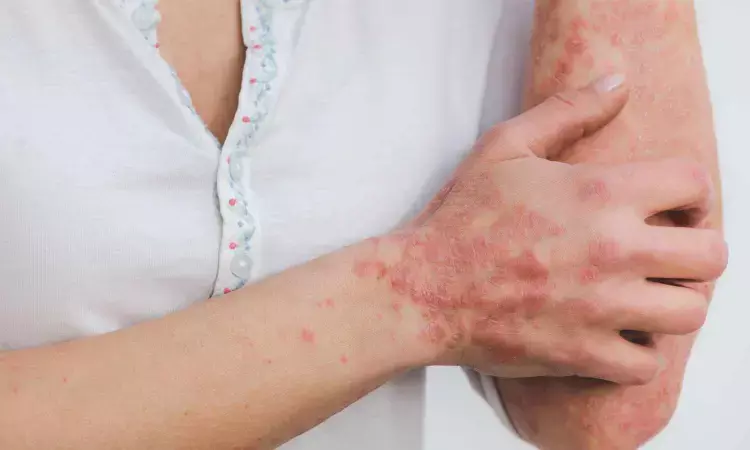- Home
- Medical news & Guidelines
- Anesthesiology
- Cardiology and CTVS
- Critical Care
- Dentistry
- Dermatology
- Diabetes and Endocrinology
- ENT
- Gastroenterology
- Medicine
- Nephrology
- Neurology
- Obstretics-Gynaecology
- Oncology
- Ophthalmology
- Orthopaedics
- Pediatrics-Neonatology
- Psychiatry
- Pulmonology
- Radiology
- Surgery
- Urology
- Laboratory Medicine
- Diet
- Nursing
- Paramedical
- Physiotherapy
- Health news
- Fact Check
- Bone Health Fact Check
- Brain Health Fact Check
- Cancer Related Fact Check
- Child Care Fact Check
- Dental and oral health fact check
- Diabetes and metabolic health fact check
- Diet and Nutrition Fact Check
- Eye and ENT Care Fact Check
- Fitness fact check
- Gut health fact check
- Heart health fact check
- Kidney health fact check
- Medical education fact check
- Men's health fact check
- Respiratory fact check
- Skin and hair care fact check
- Vaccine and Immunization fact check
- Women's health fact check
- AYUSH
- State News
- Andaman and Nicobar Islands
- Andhra Pradesh
- Arunachal Pradesh
- Assam
- Bihar
- Chandigarh
- Chattisgarh
- Dadra and Nagar Haveli
- Daman and Diu
- Delhi
- Goa
- Gujarat
- Haryana
- Himachal Pradesh
- Jammu & Kashmir
- Jharkhand
- Karnataka
- Kerala
- Ladakh
- Lakshadweep
- Madhya Pradesh
- Maharashtra
- Manipur
- Meghalaya
- Mizoram
- Nagaland
- Odisha
- Puducherry
- Punjab
- Rajasthan
- Sikkim
- Tamil Nadu
- Telangana
- Tripura
- Uttar Pradesh
- Uttrakhand
- West Bengal
- Medical Education
- Industry
Psoriasis-linked gene mutation also impacts gut health: Study

A mutation previously linked to skin disorders like psoriasis may also play a surprising role in gut health, according to new research published by scientists at VIB-UGent and colleagues from UGent, the University of Barcelona, and University College London. This mutation activates skin immune responses but also affects the intestine. This finding, published in EMBO Molecular Medicine, reveals a new connection between genetics, the immune system, and the gut, which may have therapeutical implications.
Scientists under the leadership of Dr. Inna Afonina and Prof. Rudi Beyaert (VIB-UGent Center for Inflammation Research) have found that a mutation in the gene CARD14, known for activating skin immune responses in psoriasis patients, also affects the intestine. This mutation reduces gut motility, promotes mild inflammation, and increases vulnerability to bacterial infections.
Using a mouse model that expresses the human psoriasis-associated CARD14 mutation in intestinal epithelial cells (IECs), the researchers found that the mice developed slower intestinal transit despite no damage to the gut lining or enteric nervous system. Such changes in intestinal motility are associated with many diseases.
“Our study reveals that CARD14’s impact isn’t limited to the skin,” said Aigerim Aidarova (VIB-UGent), lead author of the study. “In the intestine, this mutation leads to subtle but important changes that may contribute to subclinical intestinal symptoms in patients who carry it.”
Gut-immune crosstalk
Further analysis showed that the mutation altered the gene expression profile of IECs, including a drop in antimicrobial peptides produced by Paneth cells – specialized cells critical for gut immunity. Together with changes in the gut microbiome, this decreased antimicrobial production was linked to reduced microbial diversity and a heightened susceptibility to intestinal bacterial infections.
These findings offer new insight into the crosstalk between genetic immune regulators and gut function, and suggest that psoriasis patients with CARD14 mutations may face previously unrecognized issues that could set the stage for the development of intestinal disease.
“This research broadens our understanding of how a single genetic variant can influence different organs in the body,” said Prof. Rudi Beyaert.
“It also provides a valuable animal model to further study gut inflammation and motility disorders,” adds Dr. Inna Afonina.
The study opens new avenues for investigating the connection between genetics, immune signaling, and gastrointestinal health, with potential therapeutic implications. It also suggests that raising awareness of intestinal disease symptoms among psoriasis patients and dermatologists could be beneficial.
Reference:
Aigerim Aidarova, Marieke Carels, Mira Haegman , Yasmine Driege, Steven Timmermans, Eline Van Damme, CARD14 signaling in intestinal epithelial cells induces intestinal inflammation and intestinal transit delay, EMBO Molecular Medicine, https://doi.org/10.1038/s44321-025-00321-4.
Dr Kamal Kant Kohli-MBBS, DTCD- a chest specialist with more than 30 years of practice and a flair for writing clinical articles, Dr Kamal Kant Kohli joined Medical Dialogues as a Chief Editor of Medical News. Besides writing articles, as an editor, he proofreads and verifies all the medical content published on Medical Dialogues including those coming from journals, studies,medical conferences,guidelines etc. Email: drkohli@medicaldialogues.in. Contact no. 011-43720751


